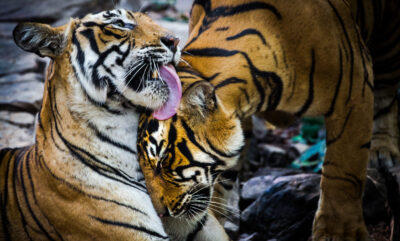
8.7 million. That’s how many different species of animals and plants scientists believe are in existence today. Each one plays a vital role. Each one is worth protecting.
Today is World Wildlife Day, the global movement intended to recognize the world’s wild animals and plants and the contribution they all make to our lives and the health of the planet. All of Earth’s species have a unique way of working together for the betterment of the ecosystems they call home—and that includes you.
Join us in honoring this important holiday and consider implementing one or more of these simple and actionable tips to keep the planet’s species—from the tallest to the smallest—alive and well.
How You Can Help Wildlife
1. FIND YOUR ENVIRONMENT EXCUSE. Reports from the Intergovernmental Panel on Climate Change show that individual lifestyle changes can eliminate some 5% of atmospheric carbon, helping to protect the world’s ecosystems and the animals and plants that inhabit them. Efforts like taking public transportation, eating less meat, embracing vintage clothes, and more can have a direct impact on food and clean water sources, wildlife reproduction, habitat health, and, ultimately, animal and plant species survival rates. Real change is attainable if we all work together and make just a few simple tweaks to our daily routines. Find ideas to get started at TheEnvironmentExcuse.org.
2. SPEAK UP. Your voice matters! If you know of environmental or conservation issues in your town or region, attend a city council meeting or contact your state representatives and demand action. Write to your federal and state elected officials encouraging them to support policies that protect wildlife.
3. GO WILD. Plant native species of flowers, trees, and bushes in your yard to conserve water and give birds and other wild animals food, shelter, and a place to raise families. Native plants also provide nectar for hummingbirds, native bees, butterflies, moths, and bats—pollinators essential to the survival of all species, including humans.
4. GIVE ‘EM SHELTER. Over 40 million acres in the U.S. now make up residential lawns and are no longer a functioning ecosystem that supports wildlife. Lawns offer minimal food and shelter for birds and small animals while consuming nearly 3 trillion gallons of water a year, 200 million gallons of gas to power lawnmowers, and 70 million pounds of pesticides. Replace some or all of your lawn with garden beds or native plants and flowers. You’ll conserve water, avoid poisoning the ecosystem, provide crucial shelter for wildlife, and attract the beneficial insects birds need to thrive.
5. JUST SAY NO. Do not use pesticides, insecticides, herbicides, or chemical fertilizers on your lawn or garden beds. These products are the leading cause of wildlife poisonings and are also toxic to companion animals. Although lethal chemicals like DDT were banned decades ago, many chemicals used today are just as dangerous to wildlife, destroying insects necessary to the food chain, and weakening or killing exposed animals. Like we mentioned above, go natural with a yard full of native plants which require less water and attract beneficial insects, which help keep pests away naturally!
6. GO DARK. Reduce light pollution. Artificial light at night has severe negative effects on wildlife. Unnatural light sources disrupt migration patterns, sleep cycles, habitat formation, and food sources necessary for the survival of birds, sea turtles, and other animals. To help, only use lighting when and where it is needed, properly shield all outdoor lights, keep your blinds drawn during the evening, and if safety is a concern, install motion detector lights and timers.
7. DON’T FENCE ME IN. Volunteer with organizations in your area to restore native forests, grasslands, and coastal ecosystems by planting native species, manually removing invasive plant species, and taking out old fences. Forests provide habitat for 80 per cent of the world’s amphibian species as well as most birds and mammals. Fences can be devastating to animals, blocking animal migration, killing animals who get caught in barbed wire, and making animals easy prey for poachers.
8. TRASH KILLS. Experts estimate plastic and trash kills over one million animals each year. Marine animals are especially vulnerable to ingesting or becoming ensnared by plastic litter. Properly dispose of trash and recycle clean containers and crushed cans. Make sure to cut apart plastic beverage rings before recycling. Participate in or hold your own local trash clean-up to help protect the habitats of imperiled species and other wildlife.
Stay in touch and get the latest WildAid updates.
SIGN UPAbout WildAid
WildAid is a non-profit organization with a mission to protect wildlife from illegal trade and other imminent threats. While most wildlife conservation groups focus on protecting animals from poaching, WildAid primarily works to reduce global consumption of wildlife products such as elephant ivory, rhino horn and shark fin soup. With an unrivaled portfolio of celebrity ambassadors and a global network of media partners, WildAid leverages more than $308 million in annual pro-bono media support with a simple message: When the Buying Stops, the Killing Can Too.
Journalists on deadline may email communications@wildaid.org